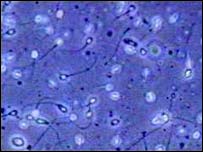|
By Michelle Roberts
BBC News health reporter in Copenhagen Tuesday, 21 June, 2005, 13:55 GMT 14:55 UK
|

Many sperm have problems moving effectively
|
Waiting too long reduces their fathering power, particularly if they already have low sperm counts, the Israeli authors say.
By looking at 1,800 semen samples from 900 men they found pausing from sex for no more than a day was best.
The study, by Soroka University Hospital, was presented at a European fertility conference in Denmark.
|
"
The best they can do is be short in their abstinence
"
Dr Eliyaho Levitas
|
Lead researcher Dr Eliyaho Levitas said: "Some people abstain for weeks thinking that they are doing good.
"But every two days would be much better."
All of the men in the study had attended Dr Levitas' fertility clinic for investigation because they and their female partners were having difficulty conceiving.
Dr Levitas divided the men up according to whether they had low or normal sperm counts.
He then looked at the quality of the sperm in relation to how long each man had abstained from sex before providing a sperm sample, which ranged from 0 to 14 days.
Among the men with low sperm counts, abstaining for two days or more reduced both the motility of the sperm - how well it can swim to the egg - and a measure called the acrosome index, which reflects what proportion of the sperm have the necessary machinery to penetrate the egg.
Quality declines
Among the men with normal sperm counts, the motility only began to decrease after 11 days of abstinence and the acrosome index hit its lowest after five days of abstinence.
Currently, many fertility clinics and sperm banks recommend three to five days abstinence. But Dr Levitas says this is too long for men with low sperm counts.
Although he did not look at whether the decline in motility and acrosome index with abstinence affected the conception rate, both factors are known to be important in infertility.
Dr Levitas told the European Society for Human Reproduction and Endocrinology annual meeting: "I'm not sure if that will lead to fertility problems.
"It might be bad, depending on where you start from - men with low sperm counts, for example.
"The best they can do is be short in their abstinence."